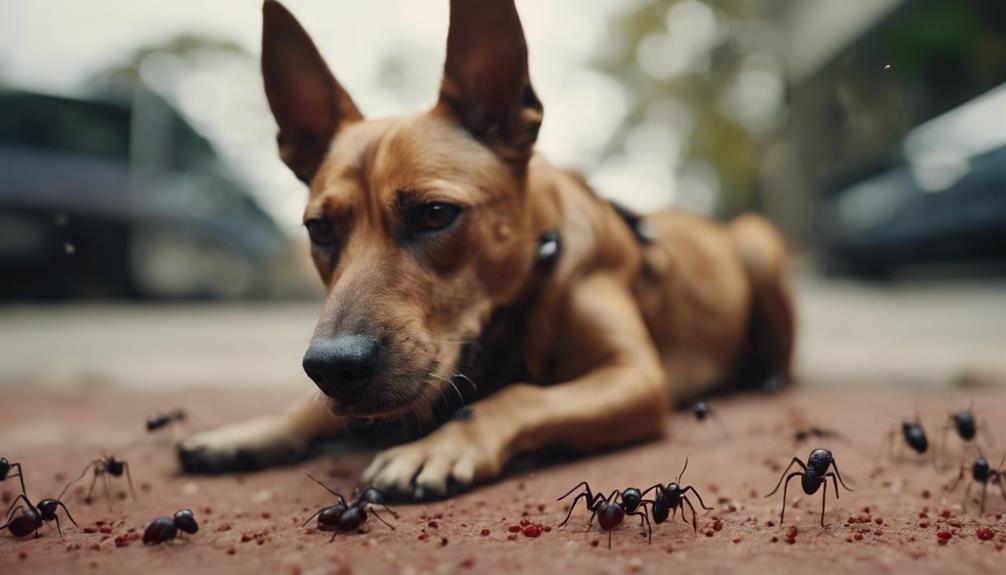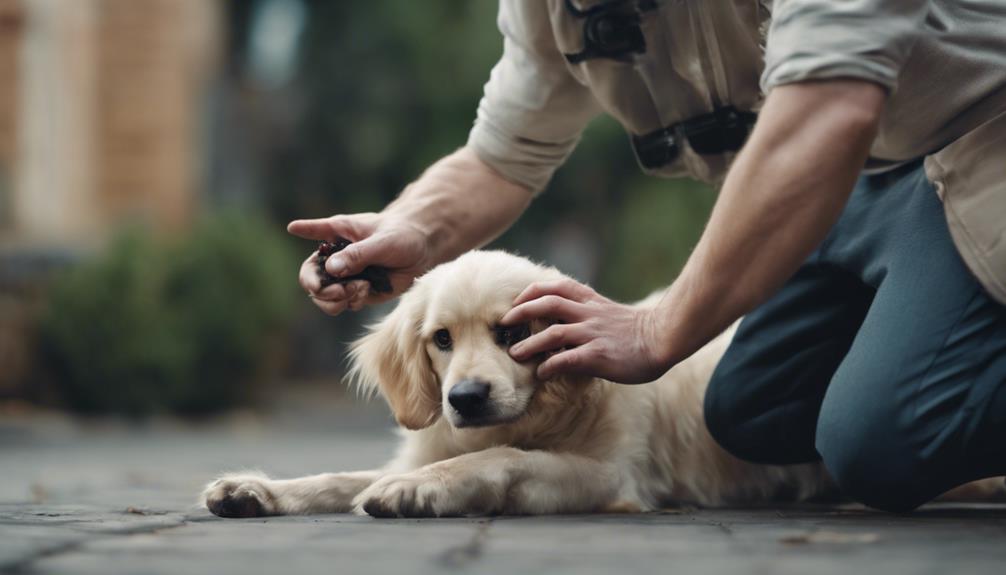In the realm of pet health, understanding the potential dangers posed by ant bites on dogs is paramount. These seemingly innocuous encounters can escalate into significant health concerns if not addressed promptly.
By grasping the nuances of how ant venom affects our canine companions and being vigilant about recognizing early symptoms, pet owners can take proactive steps to mitigate risks.
A veterinarian's perspective sheds light on crucial indicators to watch for and best practices for safeguarding dogs from these tiny yet potent adversaries.
Key Takeaways
- Fire ants pose the most danger to dogs due to their venom.
- Watch for red, swollen lesions on paws, legs, or snout.
- Serious signs include limping, weakness, or breathing issues.
- Consult a vet for tailored solutions to protect pets.
Ant Species Dangerous to Dogs
Among the diverse array of ant species worldwide, the primary concern for dogs in the U.S. lies with fire ants, notably due to their venom composition which contains piperidine. Fire ants, particularly the imported variety, are aggressive and can inflict painful stings on dogs.
These ants first appeared in the U.S. in the 1930s and have since become a widespread issue. While other common ant species like carpenter ants, pavement ants, and sugar ants rarely pose a threat to pets, fire ants are known for their potent venom.
It is crucial for dog owners to be aware of the risks associated with fire ant encounters and take necessary precautions to protect their beloved pets from these venomous insects.
Concerns With Fire Ant Venom
Fire ants, particularly the imported variety prevalent in the U.S., pose significant concerns due to the potent venom they carry containing piperidine, which necessitates understanding the potential risks associated with interactions between dogs and these aggressive insects.
- Fire ant venom can cause intense pain, swelling, and redness at the sting site in dogs, leading to discomfort and potential allergic reactions.
- Dogs may exhibit signs of distress such as excessive itching, licking, or even vocalizing due to the discomfort caused by fire ant stings.
- In severe cases, fire ant stings can result in anaphylaxis in dogs, a life-threatening allergic reaction that requires immediate veterinary intervention to prevent fatalities.
Common Ants and Pet Stings

Understanding the various types of common ants and their potential impact on pets is essential for pet owners to safeguard their furry companions from potential stings and related complications. Here is a table highlighting some common ants and their impact on pets:
| Ant Species | Potential Impact on Pets | Prevention Tips |
|---|---|---|
| Fire Ants | Severe stinging bites | Avoid ant mounds |
| Carpenter Ants | Rarely sting pets | Seal entry points in homes |
| Pavement Ants | Minimal risk for pets | Keep pet areas clean |
| Sugar Ants | Rarely sting pets | Store food properly |
Identifying Symptoms in Dogs
Identifying symptoms of ant bites on dogs is crucial for pet owners to promptly address potential health concerns in their furry companions. When observing your dog for signs of ant bites, consider the following:
- Visible Skin Lesions: Look for raised, red swollen areas on your dog's skin, particularly on their paws, lower legs, and snout.
- Behavioral Changes: Monitor your dog for signs of discomfort such as continuous limping, weakness, or excessive scratching at the bite site.
- Respiratory Distress: Keep an eye out for any difficulty breathing or other respiratory issues, as these could indicate a severe reaction to the ant bites.
Signs of Severe Reactions

When observing a dog that has been bitten by ants, it is crucial to be vigilant for signs of severe reactions that may indicate a more serious health issue requiring immediate attention. Serious signs to watch for include continuous limping, weakness, and difficulty breathing.
Dogs experiencing anaphylactic reactions to ant bites may exhibit pale gums, vomiting, or even collapse. It is essential to monitor for any unusual behavior or symptoms that go beyond typical ant bite reactions.
Severe reactions can vary among dogs, and prompt identification of these signs is critical in seeking timely veterinary care. Being aware of these indicators can help dog owners act swiftly to ensure the well-being and health of their pets.
Home Remedies for Ant Bites
To alleviate discomfort from ant bites on dogs, utilizing home remedies can be a practical and effective approach. Here are three home remedies that can help soothe ant bites on your furry friend:
- Baking Soda Solution: Create a paste by mixing baking soda with water and apply it to the affected area. Baking soda has anti-inflammatory properties that can help reduce itching and swelling.
- Lemon Juice: Lemon juice can act as a natural antiseptic and may help alleviate itching. Gently dab a small amount of lemon juice on the ant bite to provide relief.
- Olive Oil: Applying a thin layer of olive oil to the ant bite can help moisturize the skin and reduce inflammation. Olive oil also possesses soothing properties that can aid in calming the irritation caused by the ant bite.
Managing Mild Ant Bites

For mild ant bites on dogs, prompt and appropriate home care measures can effectively alleviate discomfort and aid in the healing process.
If your dog experiences mild ant bites, start by gently cleaning the affected area with mild soap and water to prevent infection. Applying a mixture of baking soda and water or a paste made from meat tenderizer can help reduce itching and inflammation. Additionally, a cold compress or ice pack wrapped in a towel can help decrease swelling.
Monitoring your dog for any signs of allergic reactions or worsening symptoms is crucial. While mild ant bites can often be managed at home, it's essential to seek professional veterinary care if your dog shows signs of severe pain, persistent swelling, or any concerning symptoms.
Professional Treatment Options
Seeking professional treatment for severe ant bites on dogs is crucial to ensure prompt and effective management of potential complications. When dealing with severe ant bites, here are three professional treatment options to consider:
- Steroid Therapy: Veterinarians may administer steroids to reduce inflammation and alleviate pain caused by severe ant bites on dogs.
- Antihistamines: These medications can help counteract allergic reactions to ant venom and minimize symptoms such as itching and swelling.
- Supportive Care: In cases of severe allergic reactions or anaphylaxis, dogs may require intensive monitoring, intravenous fluids, and other supportive care measures to ensure their well-being and recovery.
Preventing Ant Bites Outdoors

When safeguarding outdoor pets from potential ant bites, prioritizing preventive measures is essential to ensure their well-being and protection from harmful insect encounters.
To prevent ant bites on dogs, it is crucial to maintain a clean and well-kept outdoor environment. Regularly inspect and eliminate ant hills or colonies in the vicinity of your pet's play area.
Consider creating a barrier around the outdoor space using pet-safe repellents or natural deterrents like citrus peels or vinegar to deter ants. Additionally, keep outdoor trash bins tightly sealed to avoid attracting ants near your pets.
Protecting Pets From Insects
Ensuring the comprehensive protection of pets from various insect-related threats is paramount for their overall health and well-being.
- Use veterinarian-approved preventative products: Regularly apply flea, tick, and mosquito preventatives recommended by your veterinarian to protect your pet from insect-borne diseases.
- Maintain a clean environment: Keep your pet's living area clean and free of standing water to deter insects like mosquitoes from breeding and posing a threat to your pet's health.
- Regularly inspect your pet: Check your pet for any signs of insect bites, such as redness or swelling, especially after outdoor activities, and seek veterinary advice promptly if any abnormalities are observed.
Importance of Vet Consultation

For pet owners, consulting a veterinarian plays a crucial role in ensuring the optimal health and well-being of their beloved animals. Veterinary professionals possess the expertise to accurately assess the severity of ant bites on dogs and provide appropriate treatment recommendations.
Through a vet consultation, pet owners can gain valuable insights on identifying potential allergic reactions, understanding preventive measures, and receiving guidance on suitable products for insect protection. Vets can offer tailored solutions based on the specific needs of individual pets, ensuring comprehensive care and protection against potential health risks associated with ant bites.
Therefore, seeking professional veterinary consultation is essential in safeguarding the health of dogs and promoting a safe and comfortable living environment for pets.
Conclusion
In conclusion, understanding the risks associated with ant bites on dogs, particularly those from fire ants, is crucial for pet owners. Recognizing symptoms, seeking prompt veterinary care, and implementing preventive measures are essential in protecting our canine companions from potential harm.
By staying vigilant and informed, pet owners can ensure the well-being and safety of their furry friends in outdoor environments. Consulting with a veterinarian for tailored guidance and solutions is key in promoting a healthy and happy life for our pets.




